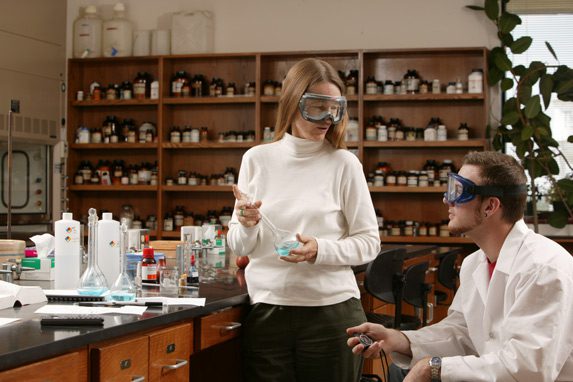
Chemistry is for students with the desire to be a part of the future and the drive to test established thought. Students who like to work with both their hands and their minds will enjoy the challenge and excitement of this creative science. Chemists work with highly sophisticated instruments, with computers, with basic lab ware and chemicals, and with other people.
Over 60% of all chemists work in industry, producing the products and technologies that shape our everyday lives – pharmaceuticals, textiles, rubber, glass, polymers, paper, conductors, and food. In the industrial environment a chemist may be working in research, inventing or improving a chemical compound or process. Other chemists are involved in manufacturing a product or running experiments to test the quality or safety of products.
More than 20 % of all chemists are engaged in teaching and/or research in schools, colleges, and universities. Chemists in educational institutions enjoy the challenge of communicating the excitement of chemistry to new generations.
Federal, state, and local governments employ about 10 % of the chemistry work force. These chemists work in a variety of governmental agencies on issues dealing with science and technology, health care, the environment, defense, and industry. Individuals with degrees in chemistry are also found working in many diverse fields such as medicine, technical writing, law, information science, agriculture, health and safety, instrumentation, sales and personnel work, management, manufacturing, library science, engineering, environmental protection, forensics, materials science, and as small business owners.
Many chemistry graduates enter the job market directly; however, approximately 60% of graduates elect post-graduate study. Approximately 10,000 men and women receive an undergraduate degree in chemistry annually; however, this number has dropped somewhat in recent years, and the National Science Foundation has expressed much concern about whether there will be sufficient numbers of trained chemists in the future.
The demand for chemists remains strong in the 21st century as society moves into a more highly developed technological age dependent on materials and the science that produces them.
The Department of Chemistry, Geosciences, and Physics offers programs of study leading to the Bachelor of Science degree in Chemistry with or without teacher’s certification. The degree prepares students for graduate studies or careers in the scientific community or academia.
Tarleton Chemical Society
The purpose of Tarleton Student Affiliate Chapter of the ACS is allowing students with an interest in chemistry to meet and interact with other like-minded students. The chapter also helps students, majoring in chemistry, make valuable contacts in the professional chemical industry.